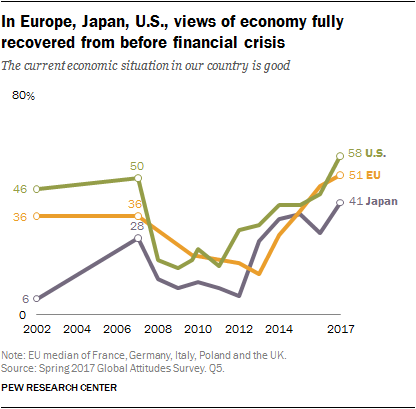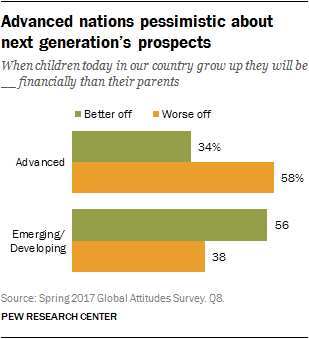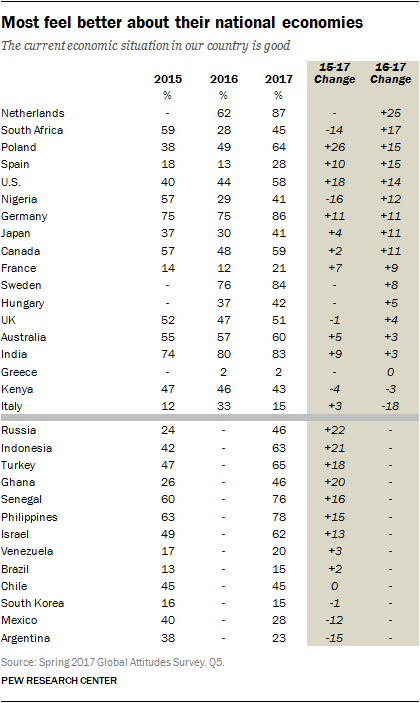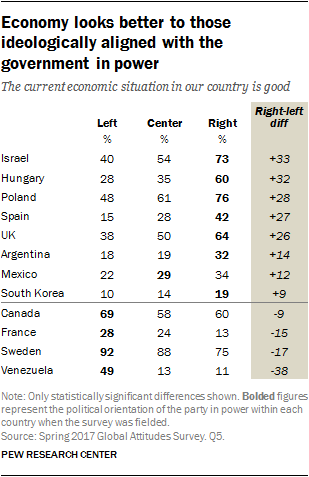Nearly a decade after the worst economic downturn since the Great Depression, economic spirits are reviving. Many Europeans, Japanese and Americans feel better today about their economies than they did before the financial crisis. More broadly, in 11 of 18 countries from across the globe that were surveyed in both 2016 and 2017, publics feel more positive about their economy than they did a year ago. The Dutch, Germans, Swedes and Indians see their national economies in the most positive light. While global publics are increasingly upbeat about economic conditions, the overall view of the economy is still in negative territory in many countries. Overall, a median of only 46% in the 32 nations surveyed this year say their current economy is doing well.
 At the same time, many are concerned about the future: A median of just 41% believe that a child in their country today will grow up to be better off financially than their parents. The most pessimistic about prospects for the next generation are the French, Japanese and Greeks.
At the same time, many are concerned about the future: A median of just 41% believe that a child in their country today will grow up to be better off financially than their parents. The most pessimistic about prospects for the next generation are the French, Japanese and Greeks.
 Across five large European economies, Japan, and the United States, public assessment of national economic conditions is now more positive than it was in 2007, immediately before the global financial crisis.
Across five large European economies, Japan, and the United States, public assessment of national economic conditions is now more positive than it was in 2007, immediately before the global financial crisis.
Nearly six-in-ten Americans (58%) believe the economic situation in the U.S. is good. The U.S. economy has experienced roughly 80 months of job growth and the unemployment rate was only 4.9% in 2016. In the spring of 2009, when the jobless rate was 9.3%, just 17% thought economic conditions were good. In 2007, before the economic downturn, 50% said conditions were favorable.
In France, Germany, Italy, Poland and the United Kingdom, a median of 51% now give their economy a positive grade. This comes in the wake of an average 1.7% growth in 2016 in the five European Union countries and an unemployment rate of 7.4%. The public’s view of the economy is up from a low of 15% across the five EU nations in 2013, when their economies grew at an annual average of only 0.6% and joblessness stood at 9.0%. In 2007, a median of 36% in those countries said their economic situation was good.
In Japan, 41% now voice the view that their economy is doing well. The Japanese economy grew by 0.8% in 2016, with unemployment at 3.1%. In 2012, despite economic growth at 1.7%, only 7% held the view that their economy was good – possibly because the unemployed accounted for 4.4% of the labor force. In 2007, before the financial crisis, 28% of Japanese said economic conditions were good.
These are among the key findings of a new Pew Research Center survey conducted among 34,788 respondents in 32 countries from Feb. 16 to April 28, 2017.
 Advanced economies more upbeat than emerging markets, developing countries
Advanced economies more upbeat than emerging markets, developing countries
The modest but sustained economic recoveries in Australia, Canada, Europe, Japan and the U.S. since the 2007-2008 financial crisis have finally buoyed public spirits about economic conditions in those countries. A median of 51% in the 17 advanced economies surveyed believes that their current economic situation is good, 45% think it’s bad. Strong upbeat sentiment in northern Europe in particular offsets quite downbeat views in southern Europe and South Korea.
Emerging market and developing economies have slowed in recent years, especially in key nations in Africa and Latin America, and public opinion in those societies reflects that slowdown. Only 45% in the 15 emerging and developing markets surveyed voice the view that current economic conditions in their nation are good, 54% believe they are bad. Positive views in India and the Philippines are offset by very negative sentiment in Venezuela and Brazil.
Emerging markets, developing countries guardedly optimistic for kids
 While publics in emerging markets and developing countries are not that happy about their current economic condition, a median of 56% nevertheless believe that when those who are children today in their countries grow up they will be better off financially than their parents. Just 38% voice the view that they will be worse off. Indians (76%), Nigerians (72%) and Chileans (69%) are particularly optimistic about economic prospects for the next generation.
While publics in emerging markets and developing countries are not that happy about their current economic condition, a median of 56% nevertheless believe that when those who are children today in their countries grow up they will be better off financially than their parents. Just 38% voice the view that they will be worse off. Indians (76%), Nigerians (72%) and Chileans (69%) are particularly optimistic about economic prospects for the next generation.
Publics in advanced economies are quite pessimistic about young people’s financial prospects, just 34% believe they will be better off than the current generation. Such despair is particularly strong in Greece, Japan, France, Australia, Canada, Spain and the UK, where roughly seven-in-ten people say today’s children will be worse off.
The recent rise in satisfaction with current economic conditions seems to have had an impact on optimism about the future in Poland in particular. The share of Poles who think the economy is doing well has gone up 26 percentage points since 2015, and the proportion that believes the future will be better for the country’s children has risen 14 points.
Economic sentiment improved
 In most nations surveyed, public views of the economic situation in their country are up, whether measured from 2015 to 2017 or 2016 to 2017.
In most nations surveyed, public views of the economic situation in their country are up, whether measured from 2015 to 2017 or 2016 to 2017.
In Russia, the share of the population that says the economy is good has almost doubled, from 24% in 2015 to 46% in 2017. This improvement came despite the fact that the Organization for Economic Co-operation and Development (OECD) reports that the Russian economy actually contracted in 2016.
Over that same period there has been a 21-point improvement in the public’s assessment of economic conditions in Indonesia and a 20-point uptick in Ghana.
In just the past year, from 2016 to 2017, economic sentiment has improved by 25 points in the Netherlands and 15 points in Spain.
The greatest erosion in public contentment with the economy has been in Italy (down 18 points since 2016), where economic satisfaction is now back to roughly 2015 levels, and in Argentina (down 15 points since 2015).
Young people more upbeat than their elders about the future
 In more than half of the countries surveyed, people ages 18 to 29 are more optimistic than those ages 50 and older about the next generation’s financial prospects. This is true in nations where people feel quite positive about their economy and in societies where people are very negative.
In more than half of the countries surveyed, people ages 18 to 29 are more optimistic than those ages 50 and older about the next generation’s financial prospects. This is true in nations where people feel quite positive about their economy and in societies where people are very negative.
Swedes of all ages feel good about current economic conditions, but there is a generational gap in views of the future. Fully 63% of young Swedes believe the future is bright, but only 37% of older Swedes agree, a 26-point differential.
Argentines of all ages are negative about their economy. But more than half of young people are positive about the next generation’s financial prospects, while only about a third of older Argentines agree.
In many emerging economies, such as India, Turkey and Brazil, more than half of the public across generations share optimism about their children’s financial future.
Sentiment about current economy and children’s prospects not always linked
 Perceptions of current economic conditions do not seem to be directly linked to expectations for the future in most nations.
Perceptions of current economic conditions do not seem to be directly linked to expectations for the future in most nations.
Americans, Canadians and some Europeans feel relatively good about their economies today. Nevertheless, few are very optimistic about the financial future for their children. While 87% of Dutch people say their economy is good, only 35% believe today’s children will be better off than their parents, a 52-point difference. There is a similar 50-point gap in German economic sentiment and a 40-point divide in Swedish views.
At the same time, only 15% of Brazilians believe their country’s economic situation is good, while 56% say the country’s children will do better than their parents, a 41-point differential. In Nigeria there is also a downbeat view of the current economy: Just 41% believe it is doing well. Yet this is coupled with an optimistic expectation for the future: 72% of Nigerians say the nation’s kids will be better off, a 31-point difference.
Those ideologically aligned with the party in power more positive than opposition
 In many countries surveyed, those who are ideologically aligned with the party in power are more positive about their country’s economic situation than those on the other end of the spectrum.
In many countries surveyed, those who are ideologically aligned with the party in power are more positive about their country’s economic situation than those on the other end of the spectrum.
This is particularly true in Israel, where 73% of those on the right say the Israeli economic situation is good, compared with only 40% on the left. There is a similar 33-percentage-point gap between the economic views of Hungarians on the right (60%) and those on the left (28%). And a 28-point right-left divide exists in Poland, a 27-point division in Spain and a 26-point disparity in the UK.
Meanwhile, people on the left (49%) are far more upbeat about the economy than those on the right (11%) in Venezuela. And in Sweden, where more than eight-in-ten people in the public overall are positive about the economic situation, there is still a significant 17-point left-right divide in public opinion.
In many of the countries where those on the right are more upbeat about the national economy, right-of-center governments are in power. And where those on the left are more optimistic about the economy, left-of-center governments were in power at the time of the survey.
CORRECTION (June 2017): The data in this report and the accompanying topline have been corrected to reflect a revised weight for Greece, Italy and the Philippines in 2017 and corrected 2015 data for Brazil. The changes due to this adjustment are very minor and do not materially change the analysis of the report.


